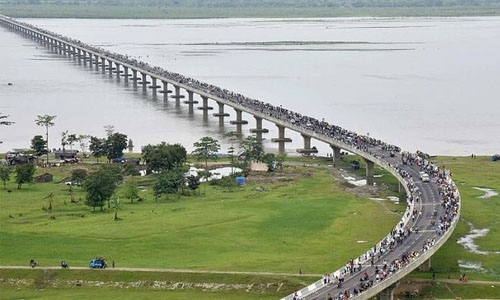India opens its longest bridge near China border
Tinsukia : India opened its longest bridge close to the border with China in a move seen as bolstering its defences in a sensitive region.
Prime Minister Narendra Modi marked the third anniversary of his rule by inaugurating the 9.1 kilometre (5.7 mile) long Dhola-Sadiya bridge over the Brahmaputra river that will link Assam and Arunachal Pradesh states.
Indian media Friday made much of the fact that the bridge has been built to support the weight of a 60 tonne tank.
Modi has launched a drive to improve infrastructure in the isolated region, which comprises seven states linked to mainland India by a sliver of land that arches over Bangladesh.
"This bridge will not only save time and money, but it will bring about a new economical revolution for the people of Assam and Arunachal Pradesh," Modi said.
The structure in mountainous Arunachal Pradesh, he said, will help farmers transport crops and herbs to markets in Assam.
Experts say the $318 million project will consolidate New Delhi's defences in the region.
"The bridge is going to help our troops get to parts that were earlier difficult to reach in times of crises," Ajit Singh, a defence research fellow at New Delhi's Institute for Conflict Management, told AFP.
"It's a step in the right direction, a proactive step by India to counterbalance China."
The government is also constructing a 2,000-kilometre highway to connect the eastern part of Arunachal Pradesh to the western side at an estimated $6 billion cost. It is carrying out a study on a possible new railway network in the area.
Earlier governments refused to construct roads near the border, fearing they could be used by Chinese troops in a conflict.
But in 2014, Modi eased rules on building roads and army facilities near the 4,056 kilometre-long (2,520 mile) border in Arunachal Pradesh, signalling a shift in India's strategic policy.
Relations between India and China are dogged by mistrust stemming from a brief border war in 1962 over Arunachal Pradesh which has a large ethnic Tibetan population.
The two sides regularly accuse each other of border incursions.
China and India ties soured this month when India boycotted a Beijing summit in opposition to a Chinese-Pakistani economic corridor that runs through disputed Kashmir.
Last month, China protested after India let Tibetan spiritual leader the Dalai Lama visit Arunachal Pradesh.
Related Posts

